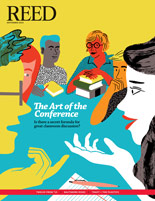
IRIS login | Reed College home Volume 94, No. 3: September 2015
In Defense of Academic Freedom
This is a reply to Professor Nigel Nicholson’s remarks about academic freedom (Eliot Circular, June 2015). His remarks neglect a crucial part of Reed’s history. In 1954, the board of trustees discharged Prof. Stanley Moore [philosophy 1948–54], a tenured member of the faculty, for refusing to discuss his political beliefs with the board. This was during the time when the spirit of McCarthyism had run wild throughout the country. It was clear to me that taking over academic institutions had become a serious sport where the prestige of the academy was hijacked to satisfy political aims.
Indeed, the very next year, acting president F.L. Griffin [mathematics 1911–56] circulated a memo to the faculty, asking them to identify colleagues with Communist sympathies. Fortunately, he withdrew his request after a delegation consisting of Prof. Frank Smith Fussner [history 1950–75], Prof. Warren Susman [history 1953–58], and myself persuaded him that it would lead the college down a perilous road.
Reed had clearly violated one tenet, though not the only one, of academic freedom. It had given in to political pressure, and the pressure was so severe that the precepts of faculty governance were violated. But academic freedom also means that the political, religious, or philosophical beliefs of politicians, administrators, and members of the public cannot be imposed on students or faculty.
This imposition was at work under the Solomon Amendment, which was passed in 1995 when the controversy over U.S. involvement in Central America was at its height. The amendment required that colleges welcome the ROTC and military recruiters or risk losing their federal contracts, and that students would lose their federal aid unless they registered for the draft. It imposed political views on colleges and college students and represented a direct attack on academic freedom.
The purpose of this comment is to inform the reader of only some of the defenses which must be in place when academic freedom is under attack. And I have barely touched the subject. Academic freedom is always under attack. People are anxious to apply the label, less anxious to focus on the things that justify its application.
For example, I am also troubled about the idea that Reed should be understood as a college which regards one of its tasks as promoting something called “inclusivity.” It may be a good or bad thing, but there is nothing in this notion which flows naturally from our precepts about teaching and passing on the properties of serious inquiry to students. If not watched carefully, it could reach the areas guarded by academic freedom—the evaluations of teaching and the composition of the curriculum. But this is simply cautionary. It does require watching.

LATEST COMMENTS
steve-jobs-1976 I knew Steve Jobs when he was on the second floor of Quincy. (Fall...
Utnapishtim - 2 weeks ago
Prof. Mason Drukman [political science 1964–70] This is gold, pure gold. God bless, Prof. Drukman.
puredog - 1 month ago
virginia-davis-1965 Such a good friend & compatriot in the day of Satyricon...
czarchasm - 4 months ago
John Peara Baba 1990 John died of a broken heart from losing his mom and then his...
kodachrome - 7 months ago
Carol Sawyer 1962 Who wrote this obit? I'm writing something about Carol Sawyer...
MsLaurie Pepper - 8 months ago
William W. Wissman MAT 1969 ...and THREE sisters. Sabra, the oldest, Mary, the middle, and...
riclf - 10 months ago